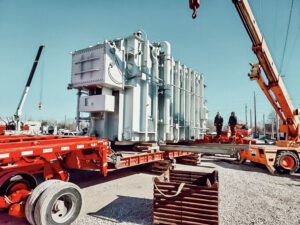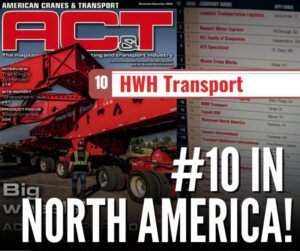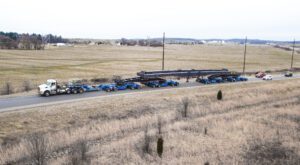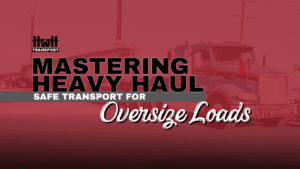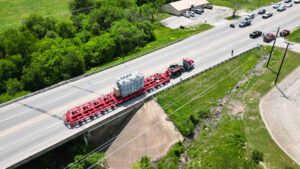“Heavy transport” typically refers to the movement of oversized or overweight cargo that exceeds the limitations of standard transportation methods. This can include items such as industrial equipment, machinery, large construction materials, and other oversize products that require specialized handling and equipment for transportation. Heavy transport often involves the use of specialized vehicles like flatbed trucks, dual-lane dollies, girder systems, low loaders, modular trailers, and even specialized ships and other attachments for particularly large or heavy loads. Companies specializing in heavy transport must adhere to regulations regarding weight limits, permits, and safety protocols to ensure the secure and efficient transportation of these goods. At HWH Transport, we ensure all drivers and transport personnel are equipped with multi-endorsement credentials and undergo routine, accredited training to keep your heavy, or oversize freight, in good hands. The following is an informative article by HWH Transport to highlight the importance of using proper equipment and coordination to guarantee a safe transport from start to finish.
Choosing the Right Hauling Equipment
The first step to ensuring the safe and efficient transport of oversized loads is selecting the appropriate heavy hauling equipment to cater to your specific project needs. Choices can range from customized flatbed trailers, lowboy trailers, and extendable trailers to specialized vehicles like self-propelled modular transporters (SPMTs). Browse through HWH Transport’s digital fleet booklet here.
Each type of equipment offers unique features and advantages tailored to various load specifications, such as weight distribution, dimensions, or transport conditions. It’s essential to carefully review your load requirements and choose the correct equipment since inadequate configurations can lead to safety risks, damage to cargo, and potential legal liabilities.
Route Planning and Infrastructure Considerations
Proper route planning is a vital aspect of heavy hauling, as it directly impacts the safety and efficiency of your transportation process. Meticulous route planning includes evaluating potential obstacles, such as road conditions, tight corners, low bridges, steep inclines, or weight-restricted structures, as well as assessing the need for any road closures or traffic control measures.
Additionally, you may need to obtain permits and coordinate with local authorities to ensure your planned route complies with legal and regulatory requirements. Properly planned routes can minimize the risk of accidents and enable a smooth, uninterrupted transport operation.
Load Preparation and Securement Techniques
To guarantee the safe transportation of oversized loads, proper load preparation, and securement techniques are crucial. According to the Federal Motor Carrier Safety Administration (FMCSA), heavy loads must be secured with adequate tiedown and restraint systems that prevent forward, rearward, and lateral movement during transit.
The use of appropriate tiedown equipment, such as chains, straps, webbing, or other specialized devices, is vital to maintain load stability and minimize the potential for damage, accidents, or non-compliance with legal requirements. Additionally, regularly inspecting and maintaining your securement devices ensures their continued effectiveness and safety.
Implementing Escort Vehicles and Pilot Cars
When hauling oversized and heavy loads, escort vehicles (also known as pilot cars) can play a crucial role in enhancing traffic safety and regulatory compliance. These vehicles accompany the heavy haul transport, helping with tasks such as alerting oncoming traffic, guiding the transportation vehicle through tight or challenging areas, and clearing potential obstacles from the transportation route.
In many jurisdictions, the use of escort vehicles is mandatory for specific types of loads or under specific circumstances. Employing properly equipped and trained escort vehicles or pilot car drivers contributes to a safer and more efficient heavy haul operation.
Expertise of Drivers and Personnel
In the realm of heavy hauling, the expertise of your operators and personnel significantly impacts the safety and success of your transportation process. Experienced heavy haul drivers possess the necessary skills and knowledge to navigate oversized loads safely and effectively, even in challenging terrain or under adverse conditions.
Additionally, well-trained project personnel, such as rigging specialists or equipment inspectors, can ensure proper transportation procedures are followed and potential risks are minimized.
Planning and Coordination
Effective scheduling and coordination are essential components of heavy hauling that can significantly impact the overall efficiency of your operation. Proper scheduling and coordination efforts may involve obtaining the necessary permits, making arrangements with local authorities for road closures or traffic control measures, and coordinating with project stakeholders to guarantee timely delivery and minimal disruption. By diligently managing these aspects, you can optimize your project timeline, reducing the likelihood of costly delays or mishaps.
Ready to make a move? Quote your Freight today.


